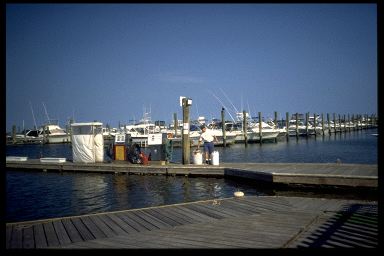
1. All Seasons Marina
Mom and Pop Marina Saves With Recycling
| Location: | 551 Roosevelt Blvd., Route 623, Marmora, NJ 08223 |
| Telephone: | (609) 390-1850; fax: (609) 390-7831 |
| Interviewed: | Ralph Dilks, General Manager |
| Owned by: | Marilyn and Ralph Dilks |
| Waterbody: | Peck Bay, on Great Egg Harbor, Atlantic Ocean |
Environmental change
Recycling has cut this New Jersey marina's trash volume and removal cost by half.
The small-boat marina with dry-stack storage
The All Seasons Marina is a private, commercial, full-service marina/yard with 300 slips and 225 in/out dry racks for boats. Best described as a home port, the business employs 14 persons year-round with 6 more part-time in the summer. Boat sizes range from just under 20 feet up to 40 feet, with 58% in the 26- to 30-foot range. Other profit centers include transient dockage, launch/haulout, boat rental, pumpout, full retail store, fuel, electronics, and beverage, ice, and bait sales. With many smaller boats, bait and tackle sales have helped boost revenues.
Moving boats in and out of the dry rack building is easy and fast with two large, negative-lift fork trucks. Larger boats are moved with a combination travel lift and hydraulic trailer. Boat services include indoor painting and engine repair.
On a typical busy weekend, about 22% of the rack-stored boats would be out in use, and about 33% of the boats in slips would be used, with half under way out of the slip. About 5% of the boats in slips would be used overnight. Within a 2-mile radius of All Seasons Marina are one other marina and several lagoons of waterfront homes with docks, raising the total number of recreational vessels kept within that radius to nearly 1,000.
The original marina was built on the site in 1941, just before the beginning of World War II, by Ralph Clayton. In 1963 Ralph and Marilyn Dilks (Clayton's daughter) bought the marina, and they have expanded it and made many improvements over the decades. All Seasons Marina is one of the best examples of "Mom and Pop" marinas in America.
Management measures
All Seasons Marina complies with the marina management measure for solid waste, as well as the measures for marina flushing, shoreline stabilization, storm water runoff control, fueling station design, sewage facility, maintenance of sewage facilities, liquid materials, petroleum control, and public education.
Costs/benefits
All Seasons Marina is a full-service facility including dockage, dry stack storage, boat/engine repair, a retail store, and boat rental, all of which generate considerable trash and solid waste. A commercial pickup and disposal service takes care of the marina's waste material. This year the service would have cost $1,200 per month in the 6-month boating season, plus $600 per month in the winter season, for a total of $10,800. But recycling has halved All Seasons Marina's trash bill, saving $5,400. Deducting an estimated $1,300 labor cost for trash separation and cardboard bundling, the net saving this year is $3,000.
Environmental improvements
To implement recycling, owner Ralph Dilks created 3 distinct recycling areas around the marina and in work buildings, plus 13 smaller disposal areas for separating cans, bottles, and other recyclables from regular trash. The entire operation is very simple and low-budget. "We even recycled some old dock material to make the marina recycling area," Ralph Dilks said, "and utilized drums which we get free." The start-up costs of new lumber, signs, and labor were estimated at $5,000 and "we wrote that off in the first year, 1986."
|
All seasons Marina's floating dock has 200 slips and a fuel dock (photo by All Seasons Marina) |
|
We have customers and staff separating the trash, and the township collects bottles,
newspaper and office paper, cans, plastics, and cardboard and packaging. All of it
goes for recycling at no cost to the All Seasons Marina. As a result, the volume
of garbage and other mixed trash commercially picked up for disposal has been chopped
by 50%." The recycling costs $1,300 per year, but saves $5,400 per year in trash
removal fees.
"Any $3,000 cost reduction in overhead," Dilks said, "is a valuable saving to any small business. And trash fees are expected to go up, so recycling savings will increase each year. And that's good for our business."
By taking advantage of available solid waste recycling programs, Ralph Dilks feels good about "keeping more stuff from going into the town landfill. The town gets paid for the recyclables it delivers, and we end up paying less for trash removal. Everybody wins with recycling."
"Most customers and all the staff participate, but we have to keep reminding them. Our ship's store and boat repair business produce a lot of cardboard boxes, which we fold flat and store on a wood pallet for pickup. Cardboard used to be a large part of our trash." All Seasons' office and shop staff are good at putting recyclable paper in separate boxes. "It's surprising how much paper our computers print out," Dilks exclaimed. "The marina represents a big part of the trash, with about 60% of the volume in the summer, but only about 10% in the winter months."
"Surprisingly, not all boat owners want to separate their trash. About half our customers come from the City of Philadelphia, where home recycling is not widely practiced. When they come here, they just don't think about separating their trash."
The first impression a visitor gets on arriving at All Seasons Marina is its neatness, landscaped beds, and huge American flag waving overhead. About 50% of the car parking area is permeable, allowing rain to be absorbed instead of causing runoff. Several years ago, All Seasons completely rebuilt, enlarged, and upgraded its restrooms. Nearby a covered fish-cleaning station handles the needs of the sportfishing folks. Water used in pressure-washing boat bottoms now is screened, filtered, and reused.
Ralph and Marilyn Dilks pride themselves on running a clean, nicely maintained marina and a well-stocked retail store, with a well-trained staff. They set a good example, widely recognized across the nation, as owners who travel together far and wide to attend training courses to stay on top of the marina and boating business. Ralph is a Director of the Marina Operators Association of America (MOAA).
The Dilkses were early adopters of new technology. For about 25 years they have
been successfully using a floating tire breakwater (reusing old tires) to protect
the docks and boats from short, choppy bay waves and to prevent shoreline erosion.
The breakwater, as is common for  floating dock structures, is a veritable artificial reef and home to
a wide range of marine plants and animals.
floating dock structures, is a veritable artificial reef and home to
a wide range of marine plants and animals.
All Seasons was among the first coastal marinas in New Jersey to install and operate pumpout services, including a homemade portable toilet dump station. "About 10 years ago, a combination of site and regulatory factors made the project less than satisfactory and overly expensive," said Marilyn Dilks. "Because the marina was originally built in wetlands, we were unable to use a septic system for the pumpout waste. The state rejected our proposal for in-ground holding tanks." A lack of clear technical information and national guidance on what to do with sewage from boats resulted in the Dilkses installing a state-mandated treatment package plant that ultimately "failed from insufficient seasonal sewage loading-a very frustrating and extremely costly venture for us," said Ralph Dilks. Currently, the boat effluent goes to state-approved in-ground holding tanks and then is picked up by a commercial septic hauler. Eventually, the town expects to install a sewer line past the business, which will be the final and best solution. All Seasons Marina has applied for a grant to upgrade the pumpout system and to be able to offer the service for free.
To further prevent contaminated storm water runoff from entering the bay, the marina uses inexpensive hay bales around the perimeter of the work yard. This year they are trying out oil absorbers in the drain areas, but haven't analyzed the effectiveness yet.
Each summer seaweed and debris build up in the corners of the marina basin. "Using our existing deice bubbler system allows us to aerate these areas and improve the water flow." The Dilkses also have observed an appreciable clearing of the water and an increase in fish species within the marina.
"Probably one of the most effective practices is simply getting rid of 'never-to-be-used-again stuff.' Cleaning after storm tides is horrendous enough," Marilyn Dilks said, "without the additional handling of old junk. This includes items kept inside offices and shops also, such as broken tools, extinct files, etc."
"Signs direct boaters to disposal areas, while our requirements and the safety policies are included in our rental agreements. Additionally, All Seasons Marina furnishes a free meeting room for U.S. Coast Guard Auxiliary boating safety courses and is designated as a 'cooperating marine dealer' for the distribution of their educational (safety and environmental) material."
Marilyn and Ralph Dilks know that education-of themselves, their staff, and their customers-is essential to having a successful full-service marina and boat retail business in an environmentally sensitive coastal area.

|

|
http://www.epa.gov/owow/NPS/marinas/ch1.html
This page last updated October 4, 1999
